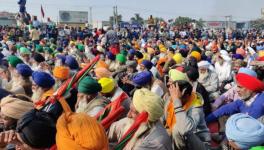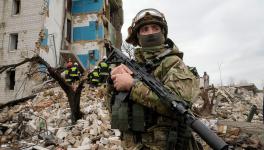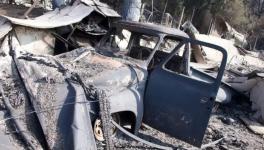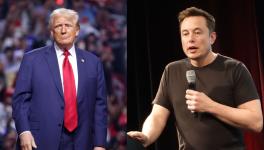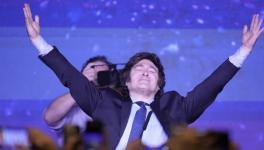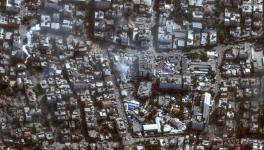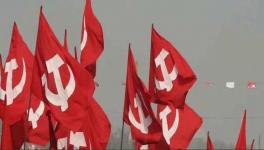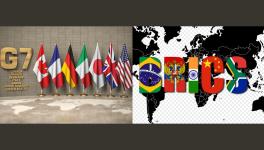Trump Expanding War From Syria to Afghanistan As Media Focuses on Comey
What is going to happen with Trump's war, global war on Islamic fascism which essentially means or might it mean a massive new increase in American troops on the ground and in the air in the middle East and maybe the first hint of that is the leak about three thousand more troops going to Afghanistan.
President Trump:And unite the civilized world against radical Islamic Terrorism which we will eradicate completely from the face of the Earth. We are protected and we will always be protected. We will be protected by the great men and women of our military and law enforcement and most importantly, we will be protected by God.
PAUL JAY:He later ... A few days later spoke at the CIA where he talked about fighting this war without restraint.
President Trump:We've been fighting these wars for longer than any wars we've ever fought. We have not used the real abilities that we have. We've been restrained. We have to get rid of ISIS. Have to get rid of ISIS. We have no choice.
PAUL JAY:Well, how was that strategy developing? It's hard to know given that the most of the media's attention is on James Comey and ending soap operas that come out of the white house and the Russia effect. The Russian affair. But the real issues are what are going ... What is going to happen with Trump's war, global war on Islamic fascism which essentially means or might it mean a massive new increase in American troops on the ground and in the air in the middle East and maybe the first hint of that is the leak about three thousand more troops going to Afghanistan. Well now joining us to talk about this is Vijay Prashad. Vijay is the George And Martha Counter Chair in South Asian history, Professor of International Studies at Trinity College. He's the author of twenty books including The Death Of The Nation and The Future Of The Arab Revolution. He's also the Chief Editor of LeftWord Books and is a Columnist for Frontline Alternate Counter Punch and all kinds of places and a regular on the Real News. Thanks for joining us Vijay.
VIJAY PRASHAD:Thanks for having me.
PAUL JAY:So ... So clearly Trump's plan was this global war against Islamic Fascism. Steve Bannon was even put on the National Security Council. He got kicked off afterwords when McMaster came on but he's still, you know, a Chief Strategist and Bannon's vision of the world and Trump certainly seem to share it implied, call for, a big military involvement and the Middle East. So are we seeing any sign of that and what do you make of this leak about troops going ... More troops going to Afghanistan?
VIJAY PRASHAD:Yes, I think that the expansion of the war from Syria on the one side to Afghanistan on the other is already in process. I think there's an error that people make in making this sort of divisions between say Trump's advisor Steve Bannon and McMaster who's at the Nation Security Council. After all, McMaster is not a dove. He is not somebody who is not interested in escalating this war. He was one of the team of people who were the architects of the surge in Iraq. He served in Afghanistan and he's called for a really long time for increasing troop involvement of both in the Iraq, Syria territory as well as in Afghanistan. Already we've seen big aerial attacks increase in Syria and in Afghanistan. We've seen the United States pledge to send more heavy weapons to the Kurdish Syrian fighters in Northern Syria and now there's this leak of where the Trump administration apparently is considering sending three thousand more US troops and when Trump goes to the Natal Headquarters on May 25th, it's very likely that he's going to ask NATO countries to increase their supply of troops as well.
Already Canada and Australia has indicated that they're open to sending more troops. So this is not merely an American expansion but the Trump administration is eager to get it's European and other rallies to contribute a very large number of troops into Afghanistan. You know, whether this is going to be effective in Afghanistan, that's a separate question. For fifteen years, the United States have spent twenty-three billion dollars per year on this war and they were found that there's been no strategic gains. In fact, one of the heads of the National Intelligence Dan Coats has recently said that the security situation in Afghanistan is worst than it's been and it's likely despite an increase in troops to deteriorate farther. So I think that yes you are right there's going to be a big hammer brought against the so called war against Islamic fascism or the war against terror. Whatever the current phrase is now in Washington will bring a big hammer down but whether this hammer will be able to hit any target as opposed to merely killing civilians is hard to say.
PAUL JAY:Well I think that's what the whole phrase, "Fighting without restraint." Means. The restraint is about don't kill too many civilians and Trump is saying fight without restraint. That means don't worry so much about killing civilians and I think we've already seen some sign of a change in that kind of strategy, have we?
VIJAY PRASHAD:Well look, the use of the so call mother of all bombs in Eastern Afghanistan was one sign of this. Trump has been eager to so called hand over operational decisions to the military and to cut back on some of the Obama era restraints. You know, for instance you might not ... People may not know this but the Taliban is not actually listed as a terrorist organizatIon. It's listed as an insurgency and during the last few years of the Obama administration, there was an attempt to actually go and push the Taliban significantly to the negotiation table. So that Mr. Obama in 2010 increased US troop size in Afghanistan to over a hundred thousand US troops but that surge didn't actually work. They were not able to bring the Taliban effectively to the negotiation table and so, you know, at the end of that Mr. Obama decided to start drawing down US troops seeing no utility in a major military escalation and he also asked the military not to target the Taliban directly.
In other words to concentrate fire on ISIS and other extremist organizations. Not the Taliban. This is a really interesting strategy and we don't have time to get into it but needless to say, you know, it hasn't of course worked. The Taliban has increased it's control over about perhaps forty percent of Afghanistan and the various extremist groups, thirty-five will show of them that operate on the Afghanistan and Pakistan border are still seized of the opportunity to grow their base. So, you know, that hasn't succeeded nor indeed I think will it return to the strategy of having a large troop presence in Afghanistan. Something other than that is necessary. For instance, putting perhaps a little more pressure on Pakistan to reconsider it's support for some of these groups and it's border.
PAUL JAY:Yeah, I think your point about the convergence of interest between a Bannonesque war on global fascism which has even some metaphysical character. We know of Bannon's connection with the far right section of the Catholic church. Opus Dei and such and but the military side, the military leaders who may or may not share this religiosity of the crusade, they also are very upset, many of them with what happened in Iraq. They said the way they ... The reason they lost in Iraq is because of this restraint and they didn't have to be ... They shouldn't ever of left Obama. Obama should never have pulled the majority of the troops up and it's very much a question of the honor and dignity but even more so the need for America to project it's power and people should tremble in their boots at that power and Iraq did not send a very good message in the same way Vietnam did not send a very good message and there's an interesting story in Vietnam which his during the war Lindon Johnson ... It became clear to Johnson that America could not win the war in Vietnam but Johnson was very dedicated to not losing the war in Vietnam.
It could not look like a debacle and there's even a story at one point talking about a pissing match that apparently Johnson actually pulled out his organ. You know, I guess people can get what organ it is, pulled it out in the White House as an example of how America would win this pissing match and as a result in the end, a million and a half people died. Well I think for people like John McCain on the political side and then much of the military leadership, Iraq is not a settled story. They don't think that Obama should have pulled out. The army shouldn't have been pulled out and they don't think the idea the American military can be defeated in the Middle East either in Afghanistan or Iraq is something they want to sit with so I think there is a quite a convergence here between the Trumpian/Bannion view and what the Pentagon and what the War Hawks, Neocon War Hawks want.
VIJAY PRASHAD:Well look, you know, whatever America's power elite, whatever their psychological problems, I think it's grotesquely unfair that their psychological problems have to be acted out against the civilians in Afghanistan, Iraq, and Syria. You know, perhaps up to a million people in Iraq or in Syria ... In Afghanistan have been killed in this long fifteen year campaign. The official numbers I think are very deflated. Officially they say that about thirty one thousand Afghans have been killed. I think this is a ludicrous number. The numbers that come from the ground are much higher so the price that's being paid by the Afghans, I think is way too high. I don't possibly think there's going to be any kind of easy military solution in the region.
You know, right after 911, the so called Shanghai Co-operation Organization which is basically the regions powers had said that they would like to get involved and hold some kind of regional deliberative very, you know, enforceable strategy to bring some sort of stability inside of Afghanistan. You know, this would include having for the very first time some border discussion between Afghanistan and Pakistan. It would include the question of the regional ambitions of various extremist groups, et cetera. So I think there are various regional solutions that should be part of the conversation but they are not. They are often eclipsed by this idea that if you wield the hammer, you can get results. And you know, our history has shown us that wielding the hammer really breaks things. It doesn't necessarily bring stability and peace.
PAUL JAY:And it's a very dangerous moment right now. I think one lesson Trump can draw from his first hundred and so days is that the one time he had the heat taken off of him on the supposed Russia agenda or Russia connection was when he bombed the airbase in Syria. All of a sudden, according to Fareed Zakaria and Chuck Schumer who was out there cheering. You know, they said he became President that day. So it's a very dangerous moment cause his way out of all of the current political chaos and crisis is to have a good war.
VIJAY PRASHAD:The more you tell somebody that when you bomb you're being President, the more you encourage them to use the military to earn high polling numbers and to earn the plaudits of the liberal intelligentsia. I think it's very dangerous and irresponsible for people such as Schumer and Zakaria to come out and say those things to Trump because it merely encourages him to use a military solution and to basically not only avoid, but to disparage other solutions. There has to be I think a calling to account of people who use armed force and, you know, basically set aside other options that are on the table. I think it's important for us to remind people that there are always other options as opposed to armed force and those other options are always set aside when you go in of are this kind of surge or escalation or this kind of talk about winning, as if winning was so easy.
PAUL JAY:Right. Well, CNN doesn't ... Isn't very interested in covering solutions though. Right now they're making a fortune out of attacking Trump but nothing makes money for CNN like a good war. Anyway, thanks very much for joining us Vijay.
VIJAY PRASHAD: Thanks a lot.
PAUL JAY:And thank you for joining us on the Real News Network
PAUL JAY:Welcome to the Real News Network. I'm Paul Jay. When President Trump was inaugurated he spoke of a global war against Islamic fascism. Heres a clip of that.
President Trump:And unite the civilized world against radical Islamic Terrorism which we will eradicate completely from the face of the Earth. We are protected and we will always be protected. We will be protected by the great men and women of our military and law enforcement and most importantly, we will be protected by God.
PAUL JAY:He later ... A few days later spoke at the CIA where he talked about fighting this war without restraint.
President Trump:We've been fighting these wars for longer than any wars we've ever fought. We have not used the real abilities that we have. We've been restrained. We have to get rid of ISIS. Have to get rid of ISIS. We have no choice.
PAUL JAY:Well, how was that strategy developing? It's hard to know given that the most of the media's attention is on James Comey and ending soap operas that come out of the white house and the Russia effect. The Russian affair. But the real issues are what are going ... What is going to happen with Trump's war, global war on Islamic fascism which essentially means or might it mean a massive new increase in American troops on the ground and in the air in the middle East and maybe the first hint of that is the leak about three thousand more troops going to Afghanistan. Well now joining us to talk about this is Vijay Prashad. Vijay is the George And Martha Counter Chair in South Asian history, Professor of International Studies at Trinity College. He's the author of twenty books including The Death Of The Nation and The Future Of The Arab Revolution. He's also the Chief Editor of LeftWord Books and is a Columnist for Frontline Alternate Counter Punch and all kinds of places and a regular on the Real News. Thanks for joining us Vijay.
VIJAY PRASHAD:Thanks for having me.
PAUL JAY:So ... So clearly Trump's plan was this global war against Islamic Fascism. Steve Bannon was even put on the National Security Council. He got kicked off afterwords when McMaster came on but he's still, you know, a Chief Strategist and Bannon's vision of the world and Trump certainly seem to share it implied, call for, a big military involvement and the Middle East. So are we seeing any sign of that and what do you make of this leak about troops going ... More troops going to Afghanistan?
VIJAY PRASHAD:Yes, I think that the expansion of the war from Syria on the one side to Afghanistan on the other is already in process. I think there's an error that people make in making this sort of divisions between say Trump's advisor Steve Bannon and McMaster who's at the Nation Security Council. After all, McMaster is not a dove. He is not somebody who is not interested in escalating this war. He was one of the team of people who were the architects of the surge in Iraq. He served in Afghanistan and he's called for a really long time for increasing troop involvement of both in the Iraq, Syria territory as well as in Afghanistan. Already we've seen big aerial attacks increase in Syria and in Afghanistan. We've seen the United States pledge to send more heavy weapons to the Kurdish Syrian fighters in Northern Syria and now there's this leak of where the Trump administration apparently is considering sending three thousand more US troops and when Trump goes to the Natal Headquarters on May 25th, it's very likely that he's going to ask NATO countries to increase their supply of troops as well.
Already Canada and Australia has indicated that they're open to sending more troops. So this is not merely an American expansion but the Trump administration is eager to get it's European and other rallies to contribute a very large number of troops into Afghanistan. You know, whether this is going to be effective in Afghanistan, that's a separate question. For fifteen years, the United States have spent twenty-three billion dollars per year on this war and they were found that there's been no strategic gains. In fact, one of the heads of the National Intelligence Dan Coats has recently said that the security situation in Afghanistan is worst than it's been and it's likely despite an increase in troops to deteriorate farther. So I think that yes you are right there's going to be a big hammer brought against the so called war against Islamic fascism or the war against terror. Whatever the current phrase is now in Washington will bring a big hammer down but whether this hammer will be able to hit any target as opposed to merely killing civilians is hard to say.
PAUL JAY:Well I think that's what the whole phrase, "Fighting without restraint." Means. The restraint is about don't kill too many civilians and Trump is saying fight without restraint. That means don't worry so much about killing civilians and I think we've already seen some sign of a change in that kind of strategy, have we?
VIJAY PRASHAD:Well look, the use of the so call mother of all bombs in Eastern Afghanistan was one sign of this. Trump has been eager to so called hand over operational decisions to the military and to cut back on some of the Obama era restraints. You know, for instance you might not ... People may not know this but the Taliban is not actually listed as a terrorist organizatIon. It's listed as an insurgency and during the last few years of the Obama administration, there was an attempt to actually go and push the Taliban significantly to the negotiation table. So that Mr. Obama in 2010 increased US troop size in Afghanistan to over a hundred thousand US troops but that surge didn't actually work. They were not able to bring the Taliban effectively to the negotiation table and so, you know, at the end of that Mr. Obama decided to start drawing down US troops seeing no utility in a major military escalation and he also asked the military not to target the Taliban directly.
In other words to concentrate fire on ISIS and other extremist organizations. Not the Taliban. This is a really interesting strategy and we don't have time to get into it but needless to say, you know, it hasn't of course worked. The Taliban has increased it's control over about perhaps forty percent of Afghanistan and the various extremist groups, thirty-five will show of them that operate on the Afghanistan and Pakistan border are still seized of the opportunity to grow their base. So, you know, that hasn't succeeded nor indeed I think will it return to the strategy of having a large troop presence in Afghanistan. Something other than that is necessary. For instance, putting perhaps a little more pressure on Pakistan to reconsider it's support for some of these groups and it's border.
PAUL JAY:Yeah, I think your point about the convergence of interest between a Bannonesque war on global fascism which has even some metaphysical character. We know of Bannon's connection with the far right section of the Catholic church. Opus Dei and such and but the military side, the military leaders who may or may not share this religiosity of the crusade, they also are very upset, many of them with what happened in Iraq. They said the way they ... The reason they lost in Iraq is because of this restraint and they didn't have to be ... They shouldn't ever of left Obama. Obama should never have pulled the majority of the troops up and it's very much a question of the honor and dignity but even more so the need for America to project it's power and people should tremble in their boots at that power and Iraq did not send a very good message in the same way Vietnam did not send a very good message and there's an interesting story in Vietnam which his during the war Lindon Johnson ... It became clear to Johnson that America could not win the war in Vietnam but Johnson was very dedicated to not losing the war in Vietnam.
It could not look like a debacle and there's even a story at one point talking about a pissing match that apparently Johnson actually pulled out his organ. You know, I guess people can get what organ it is, pulled it out in the White House as an example of how America would win this pissing match and as a result in the end, a million and a half people died. Well I think for people like John McCain on the political side and then much of the military leadership, Iraq is not a settled story. They don't think that Obama should have pulled out. The army shouldn't have been pulled out and they don't think the idea the American military can be defeated in the Middle East either in Afghanistan or Iraq is something they want to sit with so I think there is a quite a convergence here between the Trumpian/Bannion view and what the Pentagon and what the War Hawks, Neocon War Hawks want.
VIJAY PRASHAD:Well look, you know, whatever America's power elite, whatever their psychological problems, I think it's grotesquely unfair that their psychological problems have to be acted out against the civilians in Afghanistan, Iraq, and Syria. You know, perhaps up to a million people in Iraq or in Syria ... In Afghanistan have been killed in this long fifteen year campaign. The official numbers I think are very deflated. Officially they say that about thirty one thousand Afghans have been killed. I think this is a ludicrous number. The numbers that come from the ground are much higher so the price that's being paid by the Afghans, I think is way too high. I don't possibly think there's going to be any kind of easy military solution in the region.
You know, right after 911, the so called Shanghai Co-operation Organization which is basically the regions powers had said that they would like to get involved and hold some kind of regional deliberative very, you know, enforceable strategy to bring some sort of stability inside of Afghanistan. You know, this would include having for the very first time some border discussion between Afghanistan and Pakistan. It would include the question of the regional ambitions of various extremist groups, et cetera. So I think there are various regional solutions that should be part of the conversation but they are not. They are often eclipsed by this idea that if you wield the hammer, you can get results. And you know, our history has shown us that wielding the hammer really breaks things. It doesn't necessarily bring stability and peace.
PAUL JAY:And it's a very dangerous moment right now. I think one lesson Trump can draw from his first hundred and so days is that the one time he had the heat taken off of him on the supposed Russia agenda or Russia connection was when he bombed the airbase in Syria. All of a sudden, according to Fareed Zakaria and Chuck Schumer who was out there cheering. You know, they said he became President that day. So it's a very dangerous moment cause his way out of all of the current political chaos and crisis is to have a good war.
VIJAY PRASHAD:The more you tell somebody that when you bomb you're being President, the more you encourage them to use the military to earn high polling numbers and to earn the plaudits of the liberal intelligentsia. I think it's very dangerous and irresponsible for people such as Schumer and Zakaria to come out and say those things to Trump because it merely encourages him to use a military solution and to basically not only avoid, but to disparage other solutions. There has to be I think a calling to account of people who use armed force and, you know, basically set aside other options that are on the table. I think it's important for us to remind people that there are always other options as opposed to armed force and those other options are always set aside when you go in of are this kind of surge or escalation or this kind of talk about winning, as if winning was so easy.
PAUL JAY:Right. Well, CNN doesn't ... Isn't very interested in covering solutions though. Right now they're making a fortune out of attacking Trump but nothing makes money for CNN like a good war. Anyway, thanks very much for joining us Vijay.
VIJAY PRASHAD:Thanks a lot.
PAUL JAY:And thank you for joining us on the Real News Network.
Thumbnail Image Courtesy: Wikimedia Commons
Get the latest reports & analysis with people's perspective on Protests, movements & deep analytical videos, discussions of the current affairs in your Telegram app. Subscribe to NewsClick's Telegram channel & get Real-Time updates on stories, as they get published on our website.









